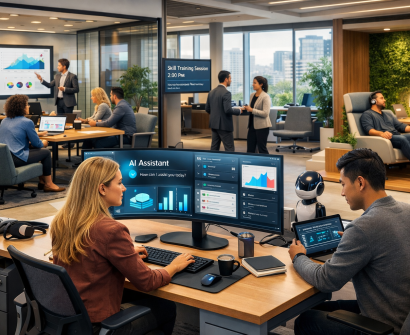Currently Empty: $0

The World Economic Forum’s Future of Jobs Report 2023 estimates that a quarter of jobs will change in the next five years, with 69 million new jobs created and 83 million eliminated. A 2024 study from the International Monetary Fund (IMF) sheds light on the complex impact of AI on global employment. Nearly 40% of global employment is exposed to AI, with advanced economies facing greater risks and opportunities. In these economies, 60% of jobs may be impacted by AI, with half benefiting from AI integration and the other half facing potential disruption.

The study finds that AI is not just affecting routine tasks, but also high-skilled jobs, highlighting the need for workers to develop new skills and adapt to the changing job market. Emerging markets and low-income countries face fewer immediate disruptions from AI but lack the infrastructure and skilled workforces to harness its benefits, raising concerns about widening inequality among nations.
IMF advocates for prioritizing education, training, and upskilling to ensure workers thrive in an AI-driven world. But how and what exactly do we upskill? In this article, we’ll explore the human skills that will be essential for success in the age of AI. We’ll also discuss the implications for organizations and job seekers.
In a world where AI is increasingly performing routine tasks, human skills have become more sought after. Here are the top 7 skills that will set you apart in the age of AI:

1. Emotional Intelligence (EQ): The ability to recognize and manage emotions effectively is critical for effective leadership and interpersonal relationships. As AI assumes more routine tasks, EQ will become the key differentiator between human leaders and machine.
2. Empathy: Understanding and sharing the feelings of others is essential for building strong relationships and creating a positive work environment. While EQ and empathy are interconnected, they are not identical concepts. Empathy is the ability to sense and understand the emotions of others, allowing you to connect with them on a deeper level. However, EQ encompasses a broader range of skills that enable you to not only understand others’ emotions but also regulate your own emotions, maintain self-control, and build meaningful relationships through effective interactions.
3. Communication: Effective communication involves more than just exchanging information; it requires active listening, understanding non-verbal cues, and adapting to different communication styles. As AI assumes more routine communication tasks, human communication skills will become more valuable than ever. Part of communication is also active listening so you are not communicating at someone but rather communicating with them.
4. Adaptability: The ability to adjust to changing circumstances, priorities, and deadlines is crucial in today’s fast-paced, AI-driven workforce. With the rise of GenAI and COVID-induced disruptions, adaptability has become the new normal.
5. Creativity: Generating new concepts and solutions is essential for driving innovation and staying ahead of the competition. As AI assumes more routine tasks, human creativity will become the key driver of business success.
6. Critical Thinking: Analyzing and evaluating information, arguments, and assumptions is critical for making informed decisions and solving complex problems. In an era where AI can generate deep fakes and create misinformation, our critical thinking skills will become more valuable than ever.
7. Relationship Building: Establishing and maintaining connections with others requires understanding human emotions, language, and behaviors. As AI assumes more routine tasks, human relationship-building skills will become the key differentiator between successful organizations and those that struggle to connect with their customers and employees.
What does this mean for you?
For Managers and HR Professionals:
- Prioritize Human Skills in Hiring and Promotion: When evaluating candidates, look beyond technical skills and focus on the human skills that will drive success in the age of AI. Assess their emotional intelligence, empathy, communication skills, adaptability, creativity, critical thinking, and relationship-building abilities.
- Invest in Training Programs: While many organizations have doubled down on AI literacy and AI adoption training, don’t forget to offer the same opportunities to upskill these human skills. This will not only enhance their performance but also future-proof your organization in this uncertain market.
- Foster a Culture of Human-Centric Development: Encourage a culture that values and rewards human skills, providing opportunities for employees to grow and develop in these areas.
For Job Candidates:
- Differentiate Yourself with Human Skills: In a crowded job market, highlighting your human skills can be a key differentiator. Any salesperson can use AI to email thousands of prospects, but how are you better at building relationships than another candidate? Many social media and marketing professionals can create beautiful and well-written posts with AI, but how are you using your creativity?
- Prepare Examples for Interviews: As you prepare for interviews, think about specific examples of how you’ve demonstrated these human skills in your current and previous roles. Be ready to share stories of how you’ve used emotional intelligence to resolve conflicts, or how you’ve adapted to changing circumstances in the workplace.
- Develop a Growth Mindset: Recognize that human skills can be developed and refined over time. Invest in your own growth and development, seeking out training programs, mentorship, and opportunities to advance your human skills.
Remember, the future of work is not about competing with machines, but about leveraging your unique human strengths to collaborate with AI.
Source: GWFM Research & Study








